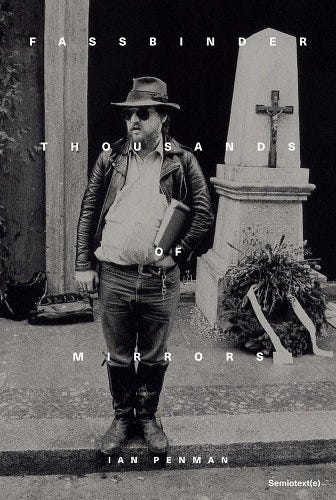I can’t think of anything more pleasurable than being in an outside coffee shop, with a threat of rain, and reading Ian Penman. There is something beautiful about Penman’s essays on whatever subject matter he’s writing about, although mostly music, that he absorbs the essence and peels it slowly for the reader. The fact his new book is on the great German Filmmaker Rainer Werner Fassbinder seems to be something I would have imagined in a dream but be impossible in life. Alias, it has happened, and the book is as magnificent as one’s passionate dreams. Fassbinder Thousands of Mirrors is a title that lives up to the reader. One of the visual motifs in a Fassbinder film are reflections, mirrors, and the doubling of the characters.
The first time I heard the name “Ian Penman” was in New Musical Express (NME) sometime in the late 1970s or early 1980s, and his writing had layers of intelligence and had a technique for one to be drawn into his world. His last book of essays, It Gets Me Home, This Curving Track (2019), is a remarkable compilation of articles regarding music and its musicians.
Fassbinder Thousands of Mirrors is his first book written on one subject matter. Even a stronger memory is my discovery of the films by Fassbinder in the 1970s. The Fox Venice in Venice, California, had a retrospective of his work, and I went to the opening night and decided to go to every show afterward. I rarely get bitten and become addicted to one’s filmography, but I honestly didn’t want to stop seeing his films. There were some I liked better than others, but all, at the very least, were interesting, and the rest were masterpieces. When Fassbinder died, I felt contemporary cinema died as well. No one at that time investigated the world with such intimacy and intensity. There are ‘wow’ moments that happen in one’s life. It can be a book or music, but in that movie theater, I felt a change in my DNA makeup, as I have never seen an artist who attacked the systems of class, race, and sexuality in such a manner that was intelligent and equally passionate. Fassbinder is an artist who engages with German history and culture and brings it out as if it were in a courtroom. In one’s face, and impossible to look away. I read many things on Fassbinder, but Penman is the only writer who I think ‘gets it,’ or we share, or at least I understand Penman’s love for Fassbinder’s work.
Penman penetrates the Fassbinder mythology and exposes the duality of how he lived his life, but also how he is a product of a culture that is not always positive. Not only do we get Fassbinder, but dealing with his mental and creative landscape, Penman touches on Douglas Sirk, Fritz Lang, and Bertolt Brecht, among others. Thinking and confronting Fassbinder opens up territories of culture and reminds one that no artist is an island by themselves.
Penman’s book is a collection of short paragraphs, and he doesn’t waste a word. There is no mess but articulate fuss in his thoughts on the relationship between the filmmaker and its subject matter. Penman embraces the chaos that is Fassbinder and captures the totality of the man’s vision, politics, and sensibility. Fassbinder Thousands of Mirrors is a classic critical approach to the artist, and a lot has to do with the Penman touch, which is witty, thoughtful, and playful. Fassbinder and Penman are both elegant figures in a world of rot, but they bring substance and a presence that is addictive to me. One can’t go wrong with either of them.



